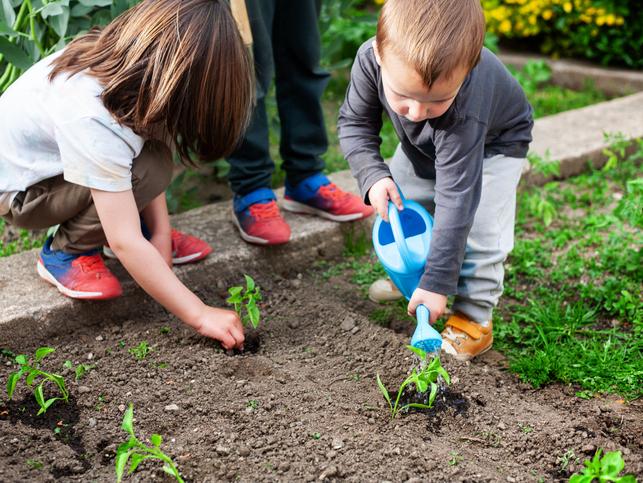
Plant the seeds for a rewarding balance between family and academia
You may also like
As we dig into the challenges of balancing family life with the demands of higher education, we can learn from the analogy of tending a garden. Just as a garden requires careful planning, consistent care and attention to detail, so too does balancing family responsibilities with academic pursuits.
Preparing the soil: laying the foundation
The first step to a successful garden is preparing the soil – enriching it with nutrients, clearing away weeds and making sure it’s ready to support healthy growth. In the context of balancing family and higher education, preparing the soil involves setting realistic expectations for yourself and your family. This foundation requires open communication, where you explain the demands of your academic pursuits and work together to set up routines that accommodate both study and family time.
- The art of balance: tips for primary carers in higher education
- How to manage parental leave for university staff
- From prams to postgraduate degrees: how universities can support student parents
Consider these questions as you prepare your soil:
What are your academic goals, and how do they align with your family’s needs?
Are there specific times of day when you can focus on your studies without compromising family time?
How can your family support you in achieving your academic goals?
By addressing these questions, you create a strong foundation for managing the demands of both family and education.
Planting the seeds: integrating family into academic life
Just as you carefully plant seeds in a garden, considering their placement for best growth, integrating family into academic life requires thoughtful planning. For students who are also parents, this might involve including children in their educational journey by sharing what they are learning or involving them in study activities. For instance, you might explain concepts in simple terms or relate them to something your children are familiar with, making it a family learning experience.
Here are a few ways to plant these seeds:
- Share your learning experiences with your family, making them feel included in your academic journey
- Involve your children in educational activities that complement your studies, such as reading together or exploring topics that relate to your coursework
- Use family time as an opportunity to discuss what you are learning, making your studies a shared experience
- This integration not only helps your family understand your academic responsibilities but also strengthens the bond between you and your loved ones.
Watering and feeding: consistent care and attention
A garden requires regular watering and feeding to flourish, just as balancing family and academic life requires ongoing effort and care. Time management is the key to ensuring that both areas of your life receive the attention they need. Setting aside specific times for study sessions, family activities and self-care ensures that neither area is neglected.
Specific actions you can take include:
- Create a schedule: block out time for study sessions, family activities and relaxation to ensure a balanced approach
- Set priorities: decide which tasks are most important each day and focus on those, allowing yourself to let go of less critical responsibilities when necessary
- Involve your family: encourage family members to respect your study time, but also involve them in your planning so that everyone feels included
- Stay consistent: keeping up with these efforts will help you keep a balance that supports both your academic and family goals.
Pruning and weeding: setting boundaries
Pruning and weeding are essential for a garden’s health, just as setting boundaries is crucial for supporting a healthy balance between family and academia. Just as you trim back overgrowth to allow for new growth, setting clear boundaries around your time and energy can prevent burnout and ensure that you are giving your best to both your family and your studies.
Here are some boundary-setting strategies:
- Establish “quiet hours”: designate specific times during the day when you focus solely on your studies and communicate this to your family
- Limit distractions: find and eliminate distractions during study time, whether that means turning off your phone, finding a quiet place to work, or setting limits on social media use
- Practise saying no: learn to decline more commitments that do not align with your priorities or that could overwhelm your schedule.
By pruning and setting boundaries, you create space for both your academic and family life to thrive without one overshadowing the other.
Harvesting: reaping the benefits of balance
A well-tended vegetable garden yields a bountiful harvest. Similarly, when you successfully balance family life with academic responsibilities, you reap the rewards of both. The satisfaction of achieving academic goals while being present for your family’s important moments is akin to the joy of harvesting ripe, healthy produce from your garden.
The rewards of balance include:
- Personal fulfilment: the satisfaction of achieving academic success while keeping a strong family connection
- Reduced stress: a balanced approach to family and academic life can reduce stress and prevent burnout, allowing you to enjoy both aspects of your life
- Strong relationships: by involving your family in your academic journey and setting clear boundaries, you strengthen the bond with your loved ones.
Balancing family life and higher education is no easy task, but like a well-tended garden, it is possible to cultivate a thriving environment where both can flourish. With careful planning, consistent care and a few strategic adjustments, you can create a life where your family and academic pursuits grow together, bringing you fulfilment and success in both areas.
John Sinclair is a part-time faculty member at the MBA programme at CSU Global.
If you would like advice and insight from academics and university staff delivered direct to your inbox each week, sign up for the Campus newsletter.




